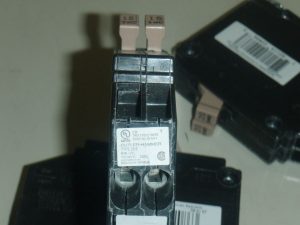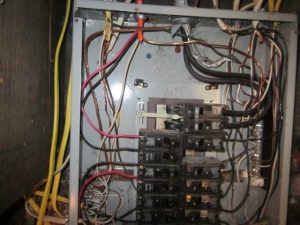Last Updated on October 22, 2023 by Kevin Chen
Circuit breaker source dengarded
You have bought a 4000 watts heater or you are planning to buy one. You will need to connect it to a perfect circuit breaker. You need to know about the breaker size for your heater. The factor that you need to consider is the power of the breaker and the wattage of your heater.
Overview of a 4000 watts heater
Heating is an important aspect in most homes and even commercial places. You will need a heater to keep your home warm. In this case, you have chosen a 400 watts heater. Maybe after a deep analysis, you are sure that this rating is perfect for you.
A 4000 watts heater is quite big and will deliver perfect heating results. In terms of the physical size, it can occupy up to 400 sq.ft.
To understand the power of a heater, you will need to know the wattage. The wattage is measured in Watts (W). In this case, the rating of your heater is 4000 watts.
So which breaker size is perfect?
A 20 amps circuit breaker is deemed a perfect fit for the 4000 watts heater, especially if you are using a 240V power outlet.
Why 20 amps circuit breaker?
The 20 amp breaker is the most common circuit breaker size in North America. It is often used for residential and commercial purposes. The reason why it is used so much is that it has a very low amp rating. This means that you have to plug more appliances into it, but it will be able to handle more power at the same time.
The 20 amp circuit breaker can withstand up to 50 amps of power. This means that you are safe for your 4000 watts heater when using this circuit breaker size.
What is the amperage of a 4000-watt heater?
How much current does a 4000 wats heater draw?
To find out the answer, we will use the formula amps =watts/voltage.
In this case, the heater is rated 4000 watts and we are connecting it to a 240V power outlet. So, the formula becomes:
amps = watts/voltage × volts
amps = 4000 watts/240 volts = 20.4 amps
What does a 20.4 amp circuit breaker mean?
It means that this circuit breaker can handle 20.4 amps of power at one time. If you try to plug in more appliances, the current will go up, but the circuit breaker is able to handle up to 50 amps of power at a time. This means that it will be able to deal with the heaters full output.
How many watts can I use?
You are free to use as much power as you want when using a 20 amp circuit breaker size. You don’t have to worry about overloads or having too much current flowing through your circuits because this size is capable of handling both large and small amounts of power at the same time without any issues whatsoever.
What if I use a circuit breaker that is less than 20 amps
Usually, there is a big temptation of using a circuit breaker whose capacity is lower than 20 amps. This move is not recommended especially if you are planning to connect it to a 400o watts heater. The main reason for this is to avoid overloading the breaker, which can cause it to fail.
So, if you want to use a smaller circuit breaker size, make sure that it is at least 20 amps. If you can’t find a size that is 20 amps or higher, then it is best if you go for a bigger size as long as it’s not too big.
What wire gauge do I need for 4000 watts?
12AWG is a perfect wire size for the 4000 watts heater that will be connected to a 20 amps circuit breaker. This wire size is thick enough to handle the power without having any issues.
Otherwise, if you are planning to upgrade to a 4500 Watt heater, then you will need a 10 AWG wire gauge. The size becomes bigger the hire you go in terms of the heater wattage.
How can I tell the right breaker for my heater?
We have already discussed the first parameter that you should check out when it comes when choosing the circuit breaker. It should be 20 amps. So, don’t use any breaker that is below 20 amps .
Another key attribute that you should look out for is the type of circuit breaker that you use. There are 2 types – “Single Pole” and “Double Pole”. Even if it 20 amps, it should be compatible with your heater’s requirements. Check out the instructions given by the manufacturer regarding the type of circuit breaker to use.
Choose a right quality breaker
Image source Internachi Forum
You should also consider the quality of the circuit breaker that you want to buy for your 4000 heaters. It is not a good idea to go for the cheapest breaker that you can find. You will surely regret it later on.
You should also look at the wiring diagram provided by the manufacturer of your 4000-watt heater.
If there is no wiring diagram available, then you should look for one that has been made by an expert electrician and has been tested by them.
What is wrong with using a larger circuit breaker?
When you use a larger circuit breaker, then it will allow the circuit to be overloaded. But in the case of a 4000-watt heater, it is not recommended to use a bigger breaker.
If you do so, then it might cause damage to your electrical wiring system and your motor. So, when you are planning to buy a circuit breaker for your 4000-watt heater, make sure that you buy one that is compatible with the requirements of the heater and that is not too big in size.
Conclusion
I hope now you know the right circuit breaker size for your 4000 watts heater. Also, don’t forget to look at the quality of the breaker. Buy from the right manufacturers and suppliers. You should also consider using sourcing agents such as ICRFQ who will help you choose quality circuit breakers in China.
If you want to find more Electronic Components Distributors, please check out the following articles:
Electronic Components Distributors In the USA
Electronic Components Distributors In UK
Electronic Components Distributors In China
Electronic Components Distributors In India
Electronic Components Distributors In Singapore
Electronic Components Distributors In Malaysia
Electronic Components Distributors In Vietnam
Electronic Components Distributors In South Korea
- Where to buy IC chips? The Best Guide? - March 26, 2024
- Breaking Down Barriers: Overcoming Obstacles in Cross-Border Electronic Component Trade - March 4, 2024
- Everything You Need to Know About Amplifier IC Chips - March 4, 2024






